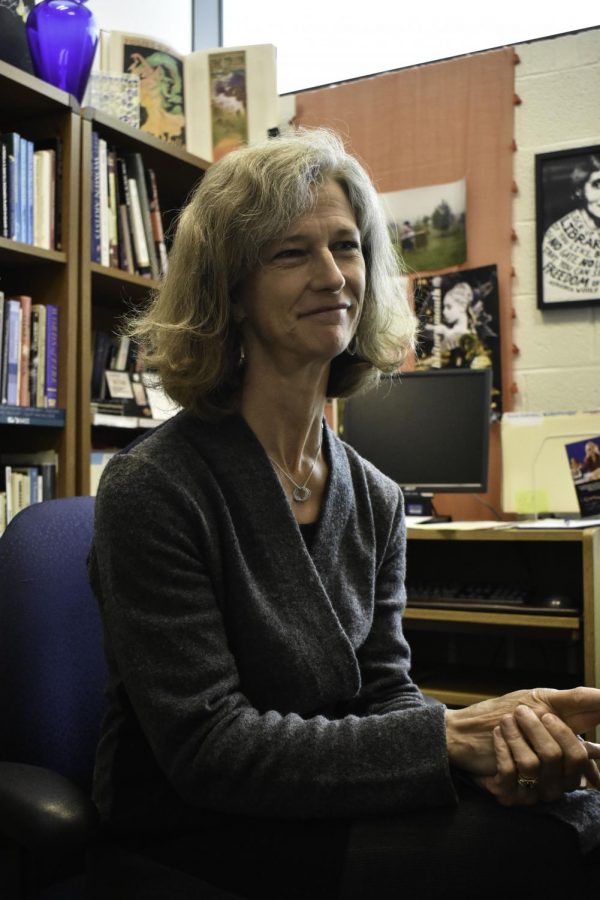Some faculty question admins on split power
Professor Suzanne Spoor said she supports AACC’s having department chairs.
November 8, 2018
A campus-wide organization that represents AACC faculty voted in October to review whether administrators are honoring a college policy to share decision-making with professors.
English professor Suzanne Spoor and Coordinator of Gender and Sexuality Studies Heather Rellihan proposed that The Faculty Organization start an ad hoc committee to study best practices in shared governance among other colleges, and to determine if AACC administrators are following those practices here.
Rellihan said shared governance is the foundation of academia and it is important for the college to regularly review how it is honoring that principle.
According to Rellihan, shared governance at the college is “uneven.”
“In certain cases, the college is doing a great job … and I think in other cases they’re not doing so well,” she said.
Astronomy professor Debra Levine, who volunteered to be a part of the committee, said faculty members at a California college where she taught before coming to AACC belonged to a union and did not have a shared governance committee.
“Shared governance is an important thing at any academic institution,” she said. “It’s something I’d like to learn more about and something the college should learn more about, too.”
According to The Faculty Organization’s charter, “TFO is the governance body through which the faculty participates in the formation and implementation of college policy affecting faculty status, welfare and workplace issues.”
The charter outlines requirements for “joint involvement” of faculty and staff and “early consultation” with faculty by administrators. The charter also specifies that “faculty is kept informed of all relevant issues.”
After Vice President for Learning Mike Gavin announced in August the college would eliminate department chairs in fall 2019, faculty complained that administrators did not consult with faculty before making that decision, according to several professors.
This left 42 department chairs unsure of their future at AACC and faculty members concerned they would have no way to gain administrative experience in the absence of a chair position, they said.
Gavin reversed the decision to eliminate chairs at a faculty meeting on Oct. 11.
Still, professors told Campus Current that recent administrative decisions about classrooms and faculty offices did not involve input from faculty.
“Decisions are being made about faculty [offices and classrooms] that were averse to the best learning environment,” Spoor said.
She pointed to a classroom in Careers that the college converted to a lounge for adjunct instructors with televisions and desks. Spoor said adjuncts “don’t watch TV during work.”
Similarly, she said, administrators planned to change a computer classroom on the second floor of the Humanities Building to a student lounge without consulting faculty. Spoor said English and communications professors need the classroom because of its location and computers, and that the room is too close to faculty offices to house a lounge.
Faculty members successfully petitioned for it to remain a classroom.
Spoor and other English professors recently objected when administrators removed a faculty member from a small faculty office in Humanities so they could turn it into a conference room.
That professor was assigned to share another office with two other colleagues.
One of them, English professor Simon Ward, said the arrangement makes it difficult to focus on work, find space for his reference books or meet with students.
TFO President Ken Jarvis agreed the arrangement could create an issue with student and faculty privacy.
After President Dawn Lindsay met with several faculty members and department chairs, Spoor said, administrators agreed to convert the conference room back to an office. She said administrators like Lindsay are just “coming around” to see the issues with shared office spaces.
Dr. Amy Allen-Chabot, chair of the faculty Academic Forum, said she is looking forward to what the TFO ad hoc committee will do for the college.
Some professors told Campus Current that disputes over shared governance, office spaces and job titles are nothing new.
“The issue goes back to [President Thomas] Florestano,” who was president from 1979 to 1994, Dr. David Tengwall, who has taught history at AACC for more than 40 years, said.
“To say [shared governance] has become an issue under this administration, it hasn’t,” he said. “It’s always been like this.”
Tengwall said when he first joined AACC, he knew every faculty member, but now the college is “much more of a business.”
In an interview with Campus Current, Gavin sometimes referred to AACC as a business.
Despite backlash from professors and department chairs over the lack of faculty input into the short-lived decision to eliminate department chairs, Gavin said making that call was “good leadership.”
He said some people on campus define shared governance incorrectly.
“We need to figure out whose decisions are whose … and when input is absolutely necessary from faculty,” he said.
Gavin said he would like an administrator to sit on the TFO’s ad hoc committee. “It would be ironic to have a shared governance committee without an administrator on it,” he said.
Rellihan and Spoor said they are unsure if an administrator should be on the committee.
Lindsay and Gavin called the recent discussion of shared governance “healthy.”
“It’s going to create a stronger degree of collaboration and … assist people with understanding the role of faculty,” Lindsay said.
Lindsay said she defines shared governance as “people working together through their backgrounds and areas of expertise and come to a common understanding of what is best for the students.”
According to Spoor, once the ad hoc committee forms, members will interview faculty, staff and administration about shared governance.












